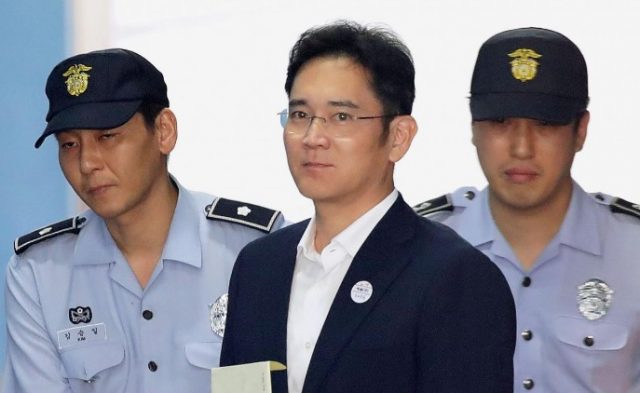
SEOUL, SOUTH KOREA — A South Korean court jailed Samsung Electronics Vice Chairman Jay Y. Lee for five years on Friday.
The Seoul Central District Court was delivering its verdict on charges against Lee, 49, ranging from bribery to perjury in a scandal that led to the ouster in March of the then president, Park Geun-hye.
Lee, who denied wrongdoing, has been in detention since February.
No ‘Plan B’
In an earlier report, Samsung Group, South Korea’s leading conglomerate, has no ’Plan B’ for taking big decisions if its billionaire de facto leader Jay Y. Lee is jailed for corruption, people familiar with the matter said.
Facing a possible leadership vacuum, Samsung Group – whose businesses range from the world’s leading smartphone and chip maker to hotels and insurance – has no plans to set up a leadership committee or a new executive role to drive strategy and take key decisions.
That could be a risk as some of the sprawling conglomerate’s weaker businesses go through a turnaround plan or look for fresh growth drivers.
“There’s no one right now who’ll decide on group-wide issues,” said a person with direct knowledge of the matter, who asked not to be named due to the sensitivity of the issue. “It’s not impossible to imagine a scenario where a Samsung affiliate gets into trouble and other units become entangled.”
Previously, Samsung would have resorted to its powerful Corporate Strategy Office – dubbed the control tower – that oversaw the group, orchestrated the big decisions on asset sales or arranged support for weakened affiliates.
But Samsung disbanded that office in February after it was criticized for its role in the graft scandal. It also suspended its weekly “Wednesday CEO meetings” of affiliate firms, leaving no centralized coordination. And Choi Gee-sung, Lee’s mentor and head of the control tower, stepped down.
“I think Samsung faces major challenges in efficiently managing the entire group … it will struggle for a while to re-establish a strategic decision making process,” Kim Sang-jo, South Korea’s new antitrust chief, told Reuters.
In a statement in response to Reuters queries, Samsung said: “The Corporate Strategy Office’s role was to support affiliates and coordinate with them, including mediating overlapping businesses and (their) different interests, but the final business decision was made by each company.”









